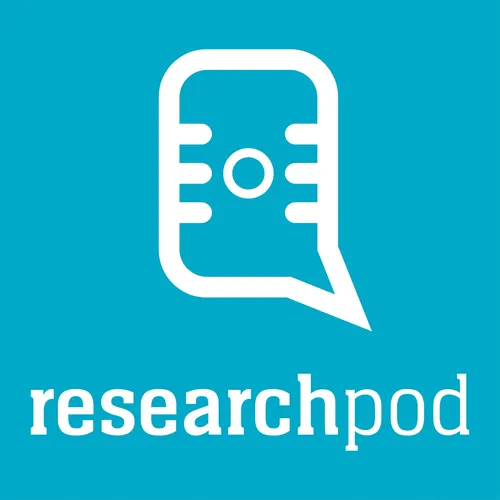
ResearchPod
ResearchPod science podcasts connect the research community to a global audience of peers and the public, raising visibility and impact. www.researchpod.org. All content is shared under the Creative Commons CCBY-NC-ND 4.0 licence. For further information, email [email protected]
- Update frequency
- every 3 days
- Average duration
- 18 minutes
- Episodes
- 486
- Years Active
- 2019 - 2025

Creating long-term, lasting change in a complex system
The third podcast episode from TRUUD explores the complexity of achieving long-term, lasting change within urban development to foster healthier lives. Host Andres Kelly discusses with Dr Krista Bond…

Crowd control and social dynamics – which way out?
Crowd management is key to evacuation safety. Yet, evacuation simulation programmes often lack experimental verification due to the inadequacy of benchmarks with real-world experiments.
Ilias Panagiot…

Pulsars and prizes: In conversation with Dame Jocelyn Bell Burnell
In the late 1960s Cambridge PhD student Jocelyn Bell Burnell was studying quasars (very luminous active galactic nuclei) when she reported anomalous data which was later identified as pulsars (‘pulsa…

Excellence Through Inclusiveness: Shaping the COST COSY Community
The COST COSY Action is redefining scientific collaboration by fostering diversity, equality, and inclusion across chemistry, physics, and materials science. Led by María Pilar de Lara-Castells, the …

Confined systems in astrochemistry
In this episode, we’re looking at research from an interdisciplinary network named COSY, funded by the European Cooperation in Science and Technology (COST) agency.
Their workgroup researching ‘Confi…

Geographies of Storage: Reshaping Contemporary Environments
Storage plays an important role in managing global resources, from energy and water to carbon and data, shaping landscapes, supply chains, and environmental systems.
Sayd Randle from Singapore Managem…

Enduring influence of EAST on Chinese society: A deep dive
The directions of Chinese politics and economics echo restrictive practices that may hinder China’s technological and economic competitiveness.
Professor Yasheng Huang’s The Rise and Fall of the EAST …

Science in the spotlight with Robin Ince
Comedian, performer, and writer Robin Ince has been asking questions about the world around him for as long as he can remember.
Perhaps most famous for his radio show The Infinite Monkey Cage which h…

A few words with… Professor Gene Feder OBE
In this International Women’s Day episode, we chat to Professor Gene Feder OBE, Professor of Primary Care at the Centre for Academic Primary Care, Bristol Medical School, about the Healthcare Respond…

Size matters: The link between social groups and human evolution with Robin Dunbar
Humans are social creatures; we live in family groups, socialise with friends, and work with colleagues both in person and online. Yet, how many friends do you really have?
Evolutionary psychologist …

New grounds for hope: Humanity can govern its complex planetary tragedies!
Humanity is overwhelmed by planetary tragedies: climate crisis, widespread hunger, desertification, migrations, destruction of biodiversity, corruption and many more. They are out of control because …

Empower Peers 4 Careers: Positive Peer Culture and Adolescent Career Choices
In Switzerland, young adults face major challenges when transitioning from school to the workplace—especially those with special educational needs. How can peer support help them navigate career choi…

Fertility, social norms, and the challenges of childbearing in East Asia
In East Asia, high marriage rates coexist with some of the world’s lowest fertility rates. So, why are so few children born in these societies? And how is this related to the strongly embedded cult…

‘Nuggets’ of Knowledge (NoK): How past experiential health emergency knowledge can inform future responses
The knowledge gained during the COVID-19 pandemic and other health emergencies could prove invaluable for devising responses to and planning for future health crises.
Dr Landry Ndriko Mayigane and Dr…

Myeloperoxidase leads the way toward safe and efficient antiseptics
Myeloperoxidase (MPO) is a vital enzyme in the immune system, with the potential to revolutionise antiseptics and cancer therapy.
Professor Robert C. Allen has developed MPO-based antiseptics effectiv…

Re-creating spaces in times of social isolation: Unveiling Hybrid Agents and Contexts for socio-educational transformation
Hybrid psychological agents and transformative hybrid contexts offer new ways to bridge cultural divides, foster inclusion, and drive social change.
Dr. Beatriz Macías-Gómez-Estern from Universidad Pa…

Can PBMCs be used as a tool for the identification of immune biomarkers in lung cancer?
Lung cancer is a leading cause of cancer-related deaths worldwide, with treatment responses varying widely among patients.
Dr. Carminia Maria Della Corte from the University of Texas MD Anderson Cance…

PrivacyPrimer: Protecting privacy while supporting memory recall for older adults
Memory is a problem for many people as they age. To combat this, wearable devices may help older adults recall precious memories through what is called 'life-logging', despite these technologies rais…

Resilience, scepticism, and mRNA with Katalin Karikó
While we may associate Messenger RNA (mRNA for short) with the COVID-19 pandemic vaccination programme, its study in fact began over 60 years ago.
Born in 1955 in rural Hungary, Katalin Karikó battled…

Personalised genetic insights: A revolution in papillary thyroid cancer
While the management of papillary thyroid cancer (PTC) is guided by recurrence risk assessment, current methods cannot accurately predict disease recurrence.
Professor Oliver Bathe and his collaborato…